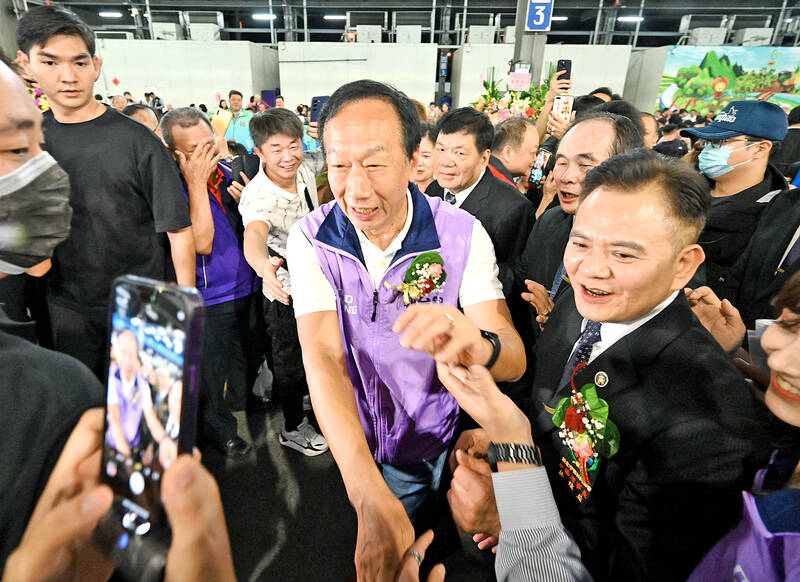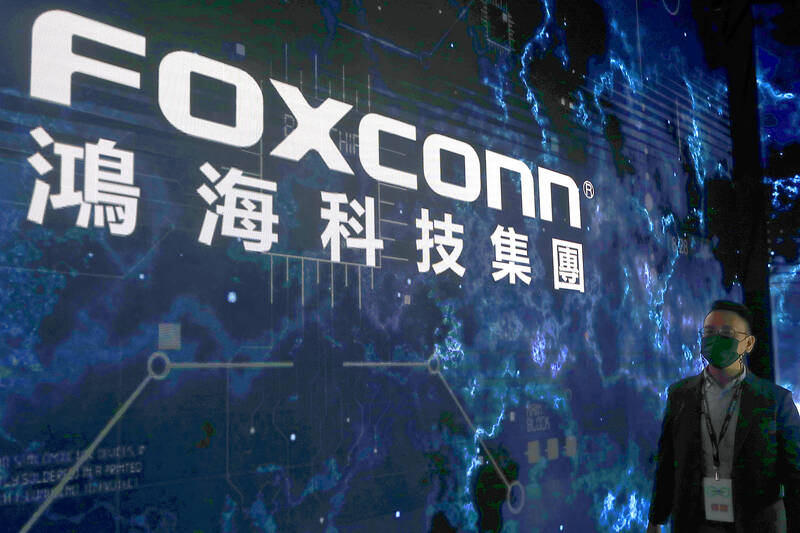Chinese tax authorities recently searched Hon Hai Precision Industry Co (鴻海精密) offices in China, Chinese state media reported on Saturday.
The Fortune 500 company, also known as Foxconn Technology Group (富士康科技集團), is known globally for making Apple Inc’s iPhones. Its founder, Terry Gou (郭台銘), announced in August that he would run for president in next year’s elections as an independent.
Chinese tax officials searched Hon Hai’s offices in Guangdong and Jiangsu provinces, while the Chinese Ministry of Natural Resources inspected the company’s offices in Henan and Hubei provinces, where it has major factories, the state-run Global Times reported.

Photo: Wang Yi-sung, Taipei Times
Hon Hai employs hundreds of thousands of workers across China.
Although the report did not provide more details about the searches, including when they occurred or what was found, it quoted an expert who said that “while Taiwan-funded enterprises, including Foxconn, are sharing in dividends from development and making remarkable progress in the mainland, they should also assume corresponding social responsibilities and play a positive role in promoting the peaceful development of cross-strait relations.”
Hon Hai, which does the vast majority of its manufacturing in China, wrote in a filing to the Taiwan Stock Exchange yesterday that “legal compliance is the basic principle for the group’s operations around the world,” adding that it would “cooperate with relevant agencies” over the investigation.

Photo: AP
The Ministry of Economic Affairs said it would maintain close contact with Hon Hai and provide assistance if necessary.
Vice President William Lai (賴清德), the Democratic Progressive Party (DPP) presidential candidate, yesterday said that Taiwanese businesspeople in China have made many contributions to China’s economy, so Beijing should cherish and take care of Taiwanese companies, rather than force Taiwanese take a political stand whenever an election approaches.
Taiwanese should support Hon Hai and other Taiwanese companies, Lai said.
“They can choose to do business in whatever country they want, and no matter where they choose, the government and the people should give them support,” he said.
Although China’s Taiwan Affairs Office (TAO) has not commented on Gou running as an independent, Lee Cheng-hung (李政宏), president of the China-based Association of Taiwan Investment Enterprises on the Mainland, early last month issued a statement saying that many Taiwanese businesspeople in China are “disappointed and concerned” about Gou’s announcement and urge him to return to the Chinese Nationalist Party (KMT).
There have been several incidents in which the Chinese government had taken action against Taiwanese companies and businesspeople in China seemingly as retaliation for political positions or to exert pressure amid sensitive moments across the Taiwan Strait.
On Nov. 24, 2021, the TAO said that the government had fined two Far Eastern Group (遠東集團) companies NT$474 million yuan (US$64.78 million at the current exchange rate) and seized some of their unused real estate for contravening environmental protection, land use, employee health, safety, tax and production quality regulations in five provinces.
TAO spokeswoman Zhu Fenglian (朱鳳蓮) at the time said that Taiwanese enterprises with investments in China should know that China does not allow Taiwanese companies and their employees to “be ungrateful,” and the heads of these enterprises should understand “whether they should or should not donate to support ‘Taiwan independence separatists.’”
A few days later, Far Eastern Group chairman Douglas Hsu (徐旭東) wrote an op-ed published in a local newspaper, in which he said he is against Taiwanese independence and supports the so-called “1992 consensus.”
The “1992 consensus” — a term that former Mainland Affairs Council chairman Su Chi (蘇起) in 2006 admitted making up in 2000 — refers to a tacit understanding between the KMT and the Chinese Communist Party that both sides of the Taiwan Strait acknowledge that there is “one China,” with each side having its own interpretation of what “China” means.
In 2016, several factories in China of Taiwanese seafood restaurant chain Hai Pa Wang (海霸王) were fined for “false labeling” and other contraventions. Later that year, the company bought a full-page ad stating that it is not a “green [pro-Taiwanese independence] Taiwanese company.”
Hai Pa Wang, which was viewed as supporting Taiwanese independence, with investors said to have close ties to President Tsai Ing-wen’s (蔡英文) family, said at the time that it has no relationship with the Tsai family other than that between “a tenant and a landlord.”
It “firmly supports that both sides of the Strait belong to one China,” it added.
Near the presidential election in 2012, when HTC Corp (宏達電) was expanding its market in China, its chairwoman Cher Wang (王雪紅) publicly expressed her support for the “1992 consensus” in a news conference, causing a stir in Taiwan.
Earlier in 2005, when China passed its Anti-Secession Law, Chi Mei Corp (奇美實業) founder Hsu Wen-lung (許文龍), who had long supported the DPP, announced his retirement and expressed his recognition of the law, saying that he is not engaged in “Taiwanese independence” activities.
People later suggested that Hsu had made the remarks under pressure, as his bank accounts were being investigated by the Chinese government.

INVESTIGATION: The case is the latest instance of a DPP figure being implicated in an espionage network accused of allegedly leaking information to Chinese intelligence Democratic Progressive Party (DPP) member Ho Jen-chieh (何仁傑) was detained and held incommunicado yesterday on suspicion of spying for China during his tenure as assistant to then-minister of foreign affairs Joseph Wu (吳釗燮). The Taipei District Prosecutors’ Office said Ho was implicated during its investigation into alleged spying activities by former Presidential Office consultant Wu Shang-yu (吳尚雨). Prosecutors said there is reason to believe Ho breached the National Security Act (國家安全法) by leaking classified Ministry of Foreign Affairs information to Chinese intelligence. Following interrogation, prosecutors petitioned the Taipei District Court to detain Ho, citing concerns over potential collusion or tampering of evidence. The

TRADE: The premier pledged safeguards on ‘Made in Taiwan’ labeling, anti-dumping measures and stricter export controls to strengthen its position in trade talks Products labeled “made in Taiwan” must be genuinely made in Taiwan, Premier Cho Jung-tai (卓榮泰) said yesterday, vowing to enforce strict safeguards against “origin laundering” and initiate anti-dumping investigations to prevent China dumping its products in Taiwan. Cho made the remarks in a discussion session with representatives from industries in Kaohsiung. In response to the US government’s recent announcement of “reciprocal” tariffs on its trading partners, President William Lai (賴清德) and Cho last week began a series of consultations with industry leaders nationwide to gather feedback and address concerns. Taiwanese and US officials held a videoconference on Friday evening to discuss the

NEGOTIATIONS: The US response to the countermeasures and plans Taiwan presented has been positive, including boosting procurement and investment, the president said Taiwan is included in the first group for trade negotiations with the US, President William Lai (賴清德) said yesterday, as he seeks to shield Taiwanese exporters from a 32 percent tariff. In Washington, US Trade Representative Jamieson Greer said in an interview on Fox News on Thursday that he would speak to his Taiwanese and Israeli counterparts yesterday about tariffs after holding a long discussion with the Vietnamese earlier. US President Donald Trump on Wednesday postponed punishing levies on multiple trade partners, including Taiwan, for three months after trillions of US dollars were wiped off global markets. He has maintained a 10 percent

PERSONAL DATA: The implicated KMT members allegedly compiled their petitions by copying names from party lists without the consent of the people concerned Judicial authorities searched six locations yesterday and questioned six people, including one elderly Chinese Nationalist Party (KMT) member and five KMT Youth League associates, about alleged signature forgery and fraud relating to their recall efforts against two Democratic Progressive Party (DPP) legislators. After launching a probe into alleged signature forgery and related fraud in the KMT’s recall effort, prosecutors received a number of complaints, including about one petition that had 1,748 signatures of voters whose family members said they had already passed away, and also voters who said they did not approve the use of their name, Taipei Deputy Chief Prosecutor